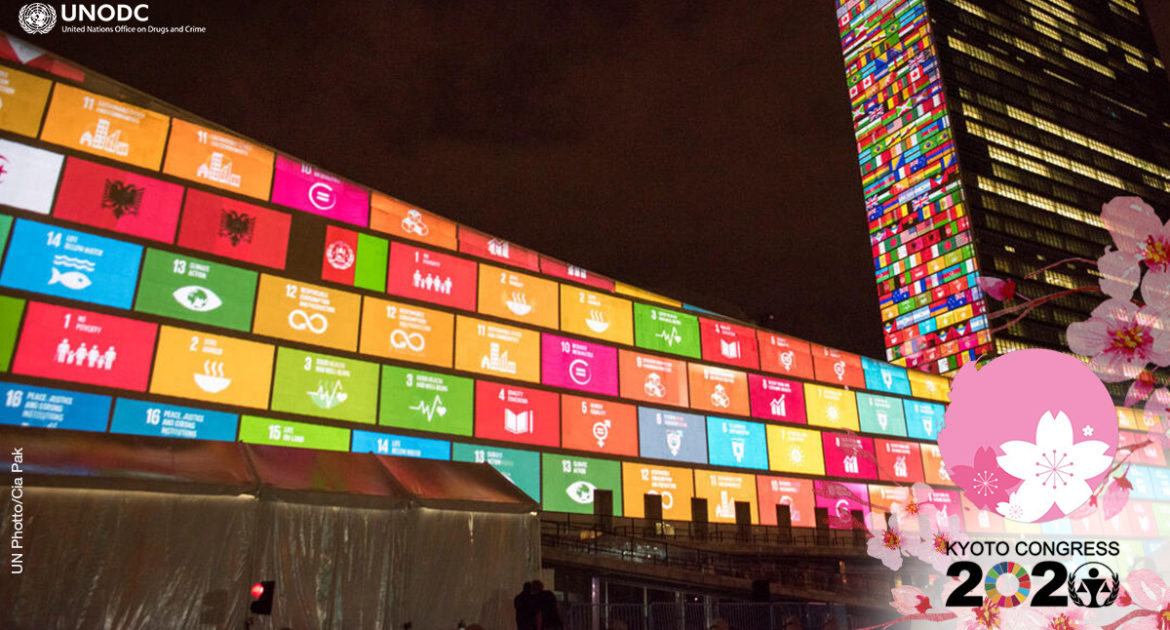
Last week, the 14th United Nations Congress on Crime Prevention and Criminal Justice was held in Kyoto. For this occasion, the IBCR participated in the event by facilitating a session on the key competencies approach to build the capacity of professionals working with children deprived of their liberty, and by participating in the elaboration of a pledge for the States and organisations present to remind them of the importance of leaving “no child behind” in the legal and penal system (in reference to the 2030 Sustainable Development Goals which promise to “leave no one behind”).
Regarding the congress :
The United Nations Congress on Crime Prevention and Criminal Justice is the world’s largest and most diverse gathering of policy-makers, practitioners, academia, intergovernmental organisations and civil society in the field of crime prevention and criminal justice. The Congresses have been held every five years since 1955 in different parts of the world, dealing with a vast array of topics. They have made considerable impact in the field of crime prevention and criminal justice and influenced national and international policies and professional practices.

The session presented by the IBCR took place online on 12 March on the theme of using a competency-based approach when building capacities of social workforce, police, justice and deprivation of liberty personnel on child-friendly services. Martin Causin, Project Manager in Burkina Faso, presented the four sets of core competencies that the IBCR has developed in collaboration with over 70 professionals and a dozen international and UN agencies on child-friendly practices.
The session aimed to remind members of governments that in order to prevent crime and adopt child-centred practices in the justice system, national training institutions need to review the way they build capacity (as opposed to awareness) among new recruits and current personnel.
Before building the capacity of social workforce, police, justice and deprivation of liberty personnel, states need to anticipate the change they want to generate, the skills, attitude and knowledge they want their personnel to acquire and put into practice.
The IBCR project in Burkina Faso, which ended in January 2021, was a very good example of cross-sectoral collaboration between partners from different sectors and with the Burkinabe government for a major revision of procedures, standards, and training practices.
The session was completed by the broadcasting of a debate held with Mathieu LOMPO, Director of Juvenile Justice at the Burkinabe Ministry of Justice, Human Rights and Civic Promotion, Martin Causin, Project Manager in Burkina Faso, and Mahamadi Oubda, Expert in penitentiary security and child protection.
The Congress was also an opportunity to reaffirm the importance of action by States around the world to enable the implementation of child rights-based criminal justice systems. The IBCR thus supported the pledge launched by Justice with Children, along with 18 other organisations, to all conference participating organisations to implement child-friendly and rights-respecting criminal justice systems, in line with international standards and best practice, in which children are empowered as agents of change.
Children face specific challenges in their relationship with criminal justice systems, due to their age, social status and dependence on adults, but this does not mean that they are not full rights holders, entitled to respect and protection.
The pledge sets out 7 courses of action:
- Ensuring a child rights-based approach to criminal justice policy and practice, including by undertaking systematic and continuous training on this approach to all relevant professionals.
- Ensuring that the best interests of the child are a primary consideration in decisions that impact upon them, including at all stages of a parent or carer’s contact with criminal justice systems.
- Upholding the child’s right to effective participation in all aspects of the development and implementation of criminal justice.
- Reviewing and reforming criminal justice legislation, policy and practice to bring them in line with the Committee on the Rights of the Child General Comment 24 on children’s rights and the child justice system.
- Implementing the recommendations of the Global Study on Children Deprived of their Liberty.
- Endorsing the Call to Action from the Pathfinders’ Task Force on Justice: the ‘Justice for Children, Justice for All’ initiative.
- Reconvene and assess progress made against the aforementioned commitments during the 2021 World Congress on Justice with Children, scheduled for November 2021.
Find the integral text of the pledge here
 Stay informed, join our community by subscribing to our newsletter!
Stay informed, join our community by subscribing to our newsletter!





